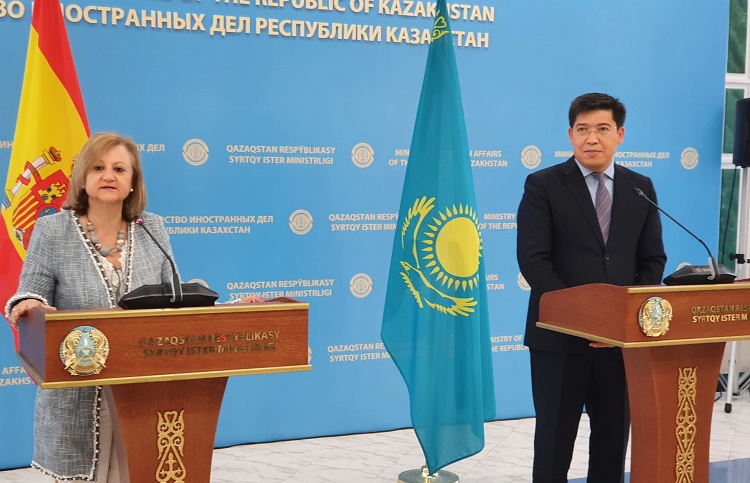The Diplomat
The Spanish government aims to consolidate the important presence of Spanish companies in Kazakhstan and, at the same time, to identify projects that will balance the trade balance between the two countries.
This was the main objective highlighted during the two-day visit to the Kazakh capital, Nur-Sultan (formerly known as Astana), by the State Secretary for Foreign Affairs, Latin America and the Caribbean, Cristina Gallach.
Gallach met with the Deputy Foreign Minister, Yerlan Alimbayev, to hold a round of bilateral consultations between Spain and Kazakhstan, in the year in which Kazakhstan celebrates the thirtieth anniversary of its independence.
A communiqué issued by the Ministry of Foreign Affairs states that, during the consultations, “issues of common interest were discussed, including bilateral relations in all areas, the possibilities for cooperation between the two countries at the multilateral level, relations between the European Union and Kazakhstan, the situation in the Central Asian region and other relevant issues on the current international agenda”.
Both sides agreed to highlight “the excellent state of the bilateral political relationship”, which is in line with the 2010 Strategic Partnership Agreement. In the economic sphere, they agreed on “the great opportunity that exists to continue working to balance the bilateral trade balance, which is currently very favourable to Kazakhstan“.
“There are a large number of economic sectors that could be of interest to Kazakhstan, such as agriculture, food, renewable energies, water resource management and transport infrastructures, where Spanish companies stand out,” the State Secretary stressed.
It was also agreed to explore the possibilities for cooperation and synergies between the Spanish Agency for Development Cooperation (AECID) and the recently established Kazakh Agency for Development Cooperation (KAZ-AID).
In the multilateral sphere, Spain and Kazakhstan work closely together on many issues, including the fight against the death penalty and nuclear non-proliferation. In this regard, Kazakhstan is a member of the Support Group of the International Commission against the Death Penalty, created at the initiative of Spain in 2010. Gallach stressed “President Tokayev’s determination to move towards the abolition of the death penalty in the country”.
The consultations were preceded by a meeting between the State Secretary and the Deputy Prime Minister and Minister of Foreign Affairs of Kazakhstan, Mukhtar Tleuberdi, to whom she presented, on behalf of the Minister of Foreign Affairs, European Union and Cooperation, Arancha González Laya, an invitation to carry out a working visit to Spain “which will contribute, she said, to strengthening the strategic relationship between two friendly countries”.
Gallach took advantage of his stay in Nur-Sultan to meet with other Kazakh authorities, such as the Commissioner for Human Rights, Elvira Azimova; with representatives of Kazakh civil society; with the Spanish community in that city; and with directors of the main Spanish companies present in the country. He also visited one of the two railway maintenance centres of the Talgo company.






